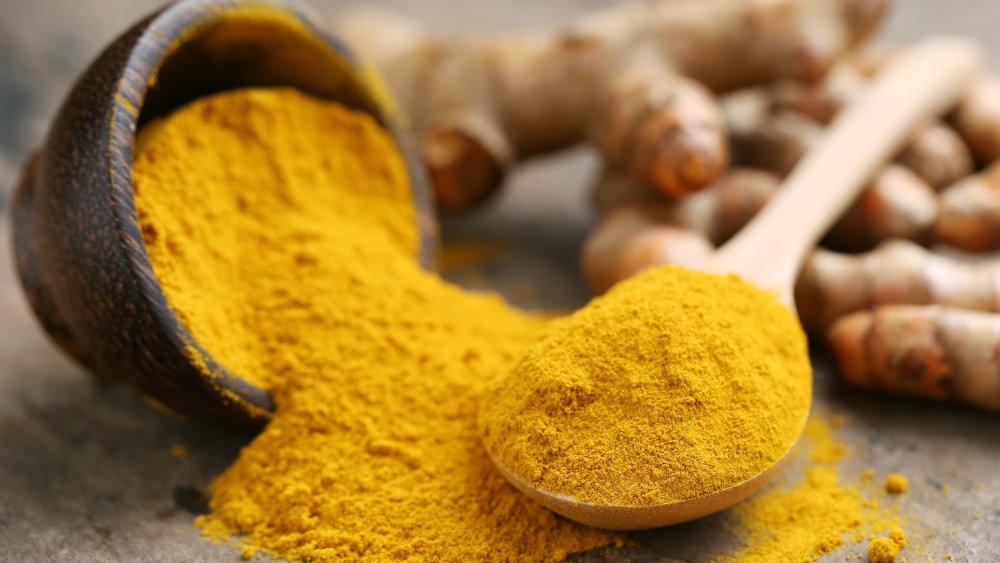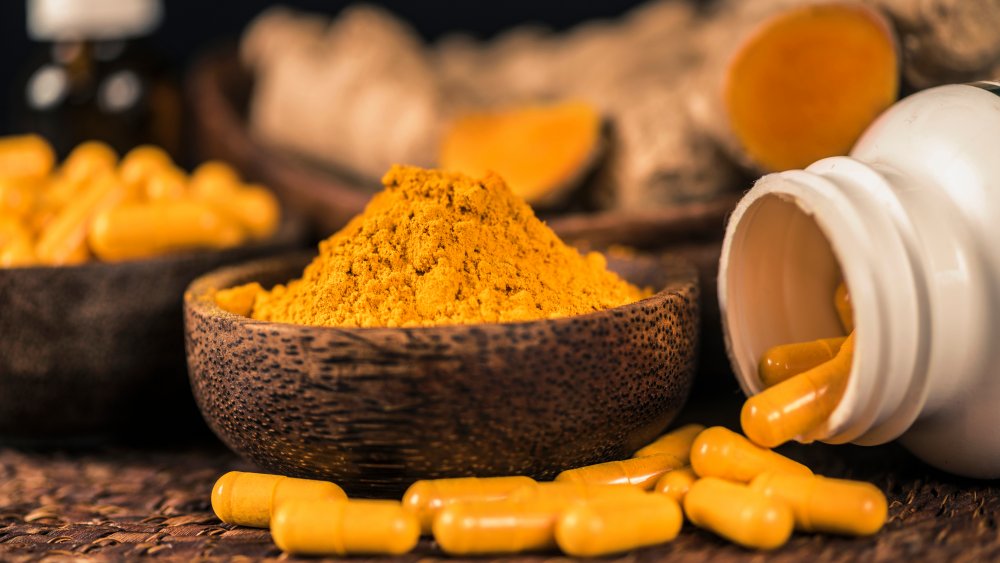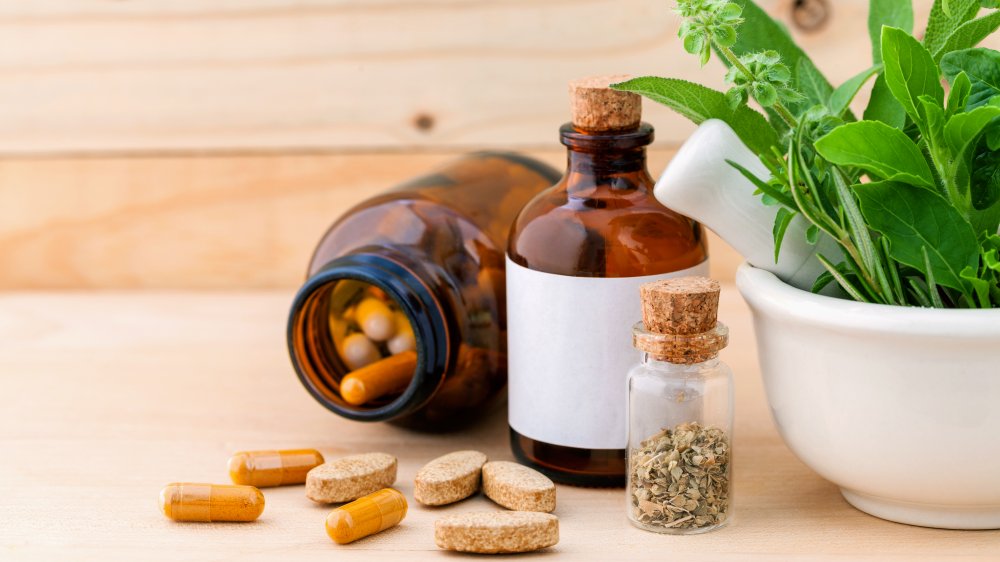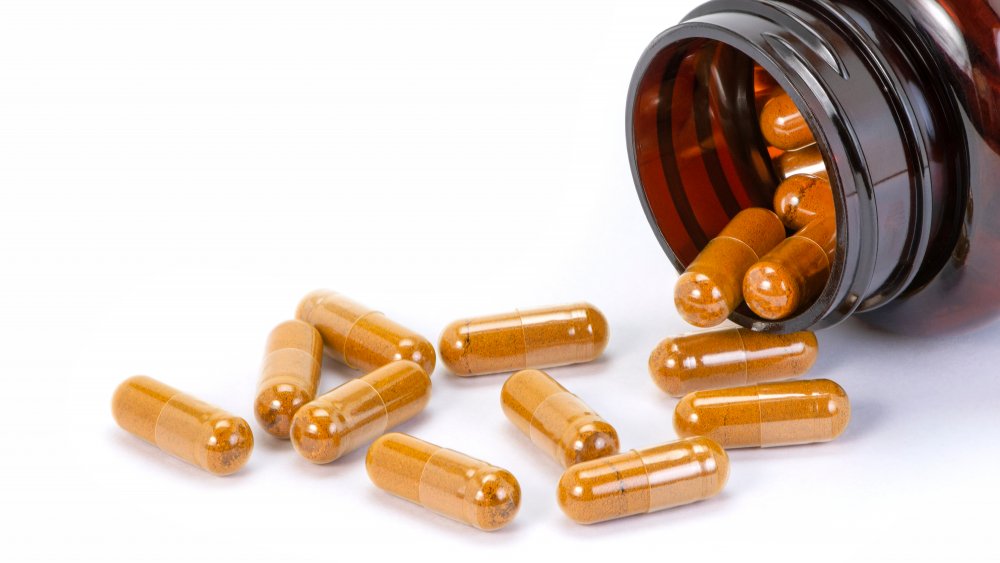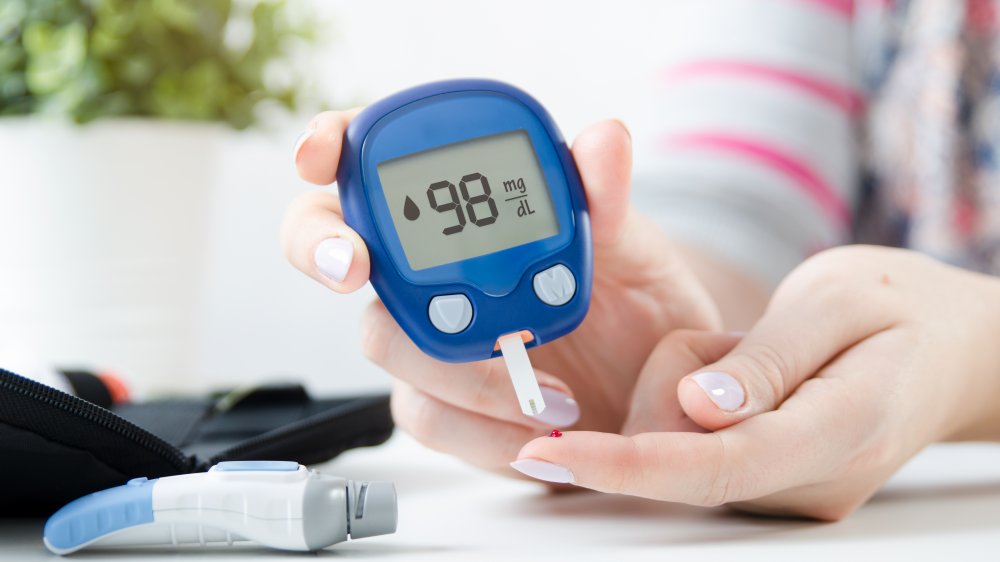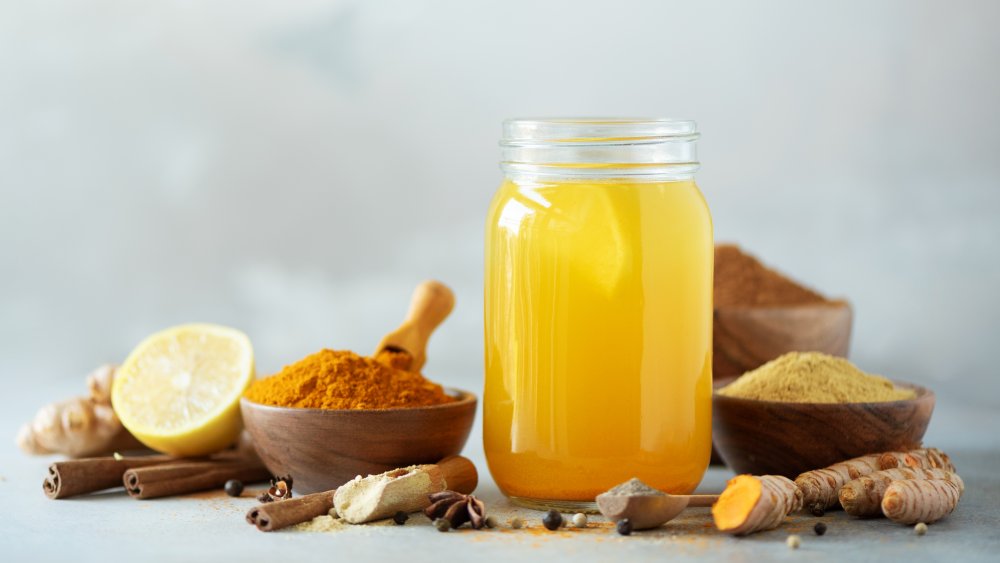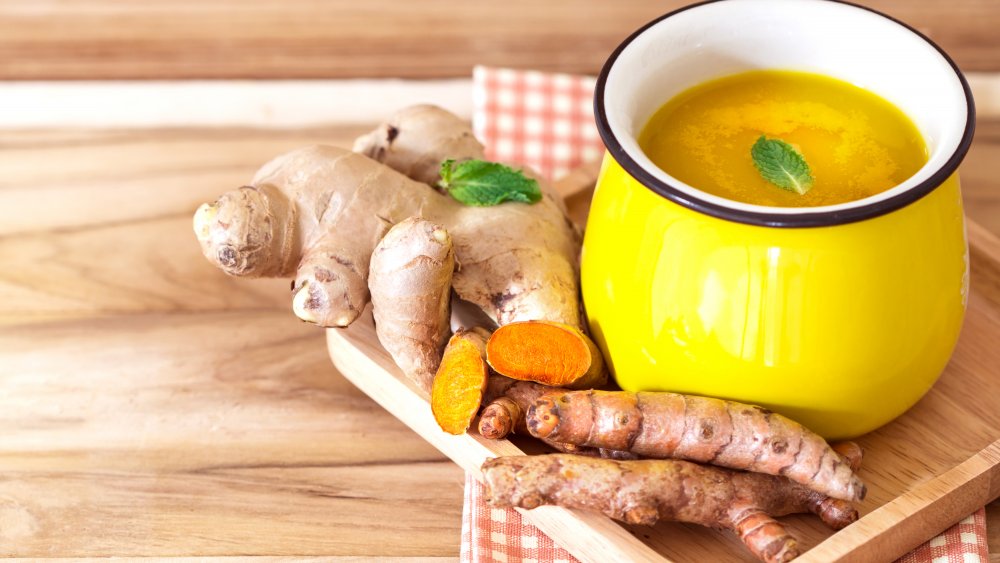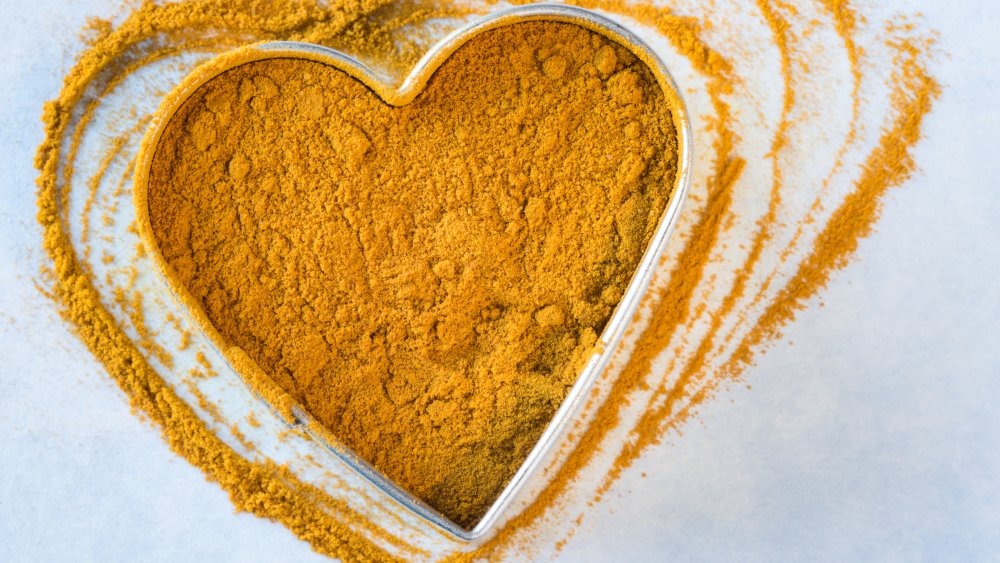When You Take Turmeric Every Day, This Is What Happens To Your Body
If you take turmeric every day, you might start to feel as if the pantry staple is actually magic fairy dust. After all, this yellow spice has a long history of being used for much more than making delicious dishes. In fact, as Healthline notes, turmeric's main antioxidant compound, curcumin, is a natural anti-inflammatory — giving the spice multiple medicinal uses.
While Eastern cultures have long known about the health benefits of turmeric, the Western world has only recently embraced the use of turmeric supplements. That's right — turmeric is more than just a weird-but-good smoothie ingredient, and more and more people have started to boast turmeric's seemingly magical reported health benefits, including cancer prevention, arthritis treatment, and cardiovascular protection (via WebMD). But, does science back up these cure-all claims — or has turmeric simply become a trend?
While some studies are inconclusive, others point to turmeric and curcumin's efficacy in fighting disease. So, instead of asking Google for the best ways to cook with turmeric, it might be time to talk with your doctor about how you can use turmeric to better your health. Here's what happens to your body when you take turmeric every day.
Taking turmeric every day could reduce your heart disease risk
Taking turmeric every day might help your ticker, according to some researchers.
A 2012 study published in Nutrition Research compared the cardiovascular benefits of exercise to the cardiovascular benefits of taking curcumin, ultimately coming to the conclusion that both habits were noticeably effective in increasing blood flow and artery dilation. The study's findings point to curcumin's "known anti-inflammatory and anti-oxidative effects," reporting that curcumin consumption and aerobic exercise "can increase flow-mediated dilation in postmenopausal women," and "potentially improve the age-related decline in endothelial function." As noted by Cedars Sinai, the endothelium is the thin membrane which lines the inside of your body's heart and blood vessels.
Additional research found that patients given curcumin after coronary artery bypass surgery had a significantly reduced risk of suffering from a heart attack in the hospital. The authors of the paper, published in The American Journal of Cardiology, credited this to curcumin's protective antioxidative and anti-inflammatory properties.
By taking turmeric every day, you could decrease your risk of getting cancer
If you take turmeric every day, you might be lowering your risk of developing cancer later in life.
Turmeric's most powerful ingredient, curcumin, might be able to mitigate one's risk for developing several types of cancer — truly making turmeric one of the best spices for your health. As noted by a 2003 study, curcumin can stop certain tumor cells from forming in the first place, leading to the belief that it has naturally anti-cancerous properties. Moreover, additional research published in 2009 found that "curcumin can kill a wide variety of tumor cell types through diverse mechanisms." According to the study, while curcumin is successful at selectively obliterating cancerous cells, it somehow knows to spare the healthy ones. These important findings strongly suggest that curcumin might have an important role in cancer prevention — and even treatment.
Nevertheless, while turmeric has been shown to halt the proliferation of tumor cells and potentially even eradicate them, WebMD notes that the ingredient could potentially impede the efficacy of certain chemotherapy drugs. In other words, oncology patients should definitely talk to their doctor before starting this or any other supplement.
Your daily intake of turmeric could help to fight off depression
Adding turmeric to your daily routine might be the mood booster you have been searching for, as some research has found evidence that treating depression and helping you deal with SAD (seasonal affective disorder) are just two examples of the life-changing uses for turmeric.
A 2013 study involving 60 patients with major depressive disorder determined that patients who took curcumin saw similar symptom improvement to those given fluoxetine (better known as Prozac). Patients given both the drug and the supplement benefited even more. As noted by Mayo Clinic, antidepressants are not a one-size-fits-all drug; finding the right dose for a patient can often feel like a game of trial and error. So, having a more natural option to turn to — such as curcumin — can be a huge help to struggling patients and open-minded doctors.
Additional research published in 2008 indicated that using traditional antidepressant drugs in tandem with curcumin and piperine — an alkaline in black pepper that helps with absorption — could potentially boost serotonin and dopamine levels, creating a more effective approach to overall treatment. However, one should always consult with a professional before self-medicating.
You can decrease your risk of Alzheimer's disease with a daily dose of turmeric
Could taking turmeric every day hold the key to unlocking the mysteries of Alzheimer's disease?
A UCLA research team lead by Gary Small published a study in a March 2018 issue of the American Journal of Geriatric Psychiatry which yielded encouraging results regarding the use of curcumin – the main component of turmeric — in preventing Alzheimer's disease. Researchers monitored 40 participants who didn't suffer from dementia, giving half of the participants curcumin and the other half a placebo. According to the 18 month-long study, Small and his team saw a major uptick in memory retention in those who took curcumin. Furthermore, PET scans showed physical brain differences between the curcumin and placebo groups. Participants who consumed curcumin regularly had less visible binding in the brain and fewer formations of pathologic proteins, a major marker of dementia and Alzheimer's disease. The placebo-takers, however, had significantly more binding.
"This relatively inexpensive and nontoxic treatment may have a potential for not only improving age-related memory decline, but also preventing or possibly staving off progression of neurodegeneration and eventually symptoms of Alzheimer's disease," researchers noted in their report.
Taking turmeric every day could ease arthritis symptoms
Turmeric just might be the arthritis remedy your aching joints have been waiting for.
In a 2019 study published in Trials, researchers observed 139 individuals with osteoarthritis of the knee. Half of the participants were given the anti-inflammatory drug diclofenac twice a day, while the remaining group was administered curcumin three times a day. The result? Both sets of patients saw similar levels of improvement in symptoms, but those who took the potent natural ingredient in turmeric reported fewer side effects. In comparison to curcumin, diclofenac was found to be harsher on the stomachs of many patients. Since turmeric is known to have natural anti-inflammatory properties, this finding was not a huge surprise to many who have long touted its benefits. However, a bonus discovery was that those who took curcumin lost an average of two percent of their weight in just one month.
While these results sound promising, there are counterarguments to consider. As noted by Harvard Health Publishing, the study measured the efficacy of one specific NSAID dosage, and focused exclusively on arthritis of the knee.
You can fight aging and inflammation by taking turmeric every day
Turmeric might work to fight signs of aging while also protecting your body from certain illness, according to some studies.
Many chronic conditions are believed to be caused by perpetual inflammation, fueled by proteins secreted from the cells of the immune system. With this in mind, researchers set out to prove that one can slow the progress of aging and postpone the onset of disease by blocking certain types of long-term inflammation through the use of curcumin. Their findings, published in 2015, revealed the super-ingredient in turmeric can selectively see the proteins that cause inflammation and suppress their negative effects.
In addition to turmeric's anti-inflammatory benefits, an article in the Indian Journal of Clinical Biochemistry pointed to its antioxidant powers. According to research cited in the article, the spice inhibits free radicals and essentially undoes some of the damage caused by aging or illness-causing behaviors, such as "smoking, drinking alcohol, eating fried foods, or being exposed to air pollution or pesticides."
You can help to prevent the onset of type 2 diabetes by taking turmeric every day
Turmeric might not be the first thing to come to mind when thinking of diabetes prevention — but according to some researchers, the spice could play a major role in keeping your blood sugar levels under control.
A 2012 study published in Diabetes Care credited curcumin, the compound found in turmeric, for the marked delay in patients' progression from being categorized as pre-diatetic to officially receiving a type 2 diabetes diagnosis. The same research additionally indicated that curcumin can enhance the workings of beta cells, which help in the production of insulin, the hormone that ensures the proper use and storage of glucose from carbs and prevents blood-sugar elevation. Moreover, a 2013 study of curcumin's effect on type 1 diabetes found that the supplement could potentially help improve the disease over time, or perhaps even provide a cure. However, this research was conducted on rats, not humans — so, take it with a grain of salt (or turmeric).
While a healthy diet and exercise are key components to diabetes prevention and treatment, turmeric could possibly be a beneficial addition to a healthier lifestyle.
By taking turmeric every day, you can help your body fight off many viral infection
A turmeric supplement a day just might deep the doctor away.
An article published in Frontiers in Microbiology asserted that curcumin has both anti-viral and anti-bacterial abilities, and has been useful in fighting "various important human pathogens like the influenza virus, Hepatitis C virus, HIV, and strains of Staphylococcus, Streptococcus, and Pseudomonas." Additionally, one study by researchers at the Jawaharlal Nehru Centre for Advanced Scientific Research indicated that the addition of curcumin to HIV-infected laboratory cells halted the virus from reproducing (via Everyday Health). While this is certainly exciting scientific news, additional research noted by the online publication found that the spice had little to no effect in treating the disease. Simply put, it's a mixed bag of results, and additional studies are needed.
Nevertheless, there's no doubt that turmeric's possible medicinal uses are not to be glossed over, and its naturally anti-bacterial and anti-viral qualities make it an important source of further pharmaceutical study. But, until there are more definitive answers, consider pouring yourself a cup of turmeric tea the next time you feel a sniffle coming on, as suggested by WebMD.
You can relieve bad PMS symptoms by taking turmeric every day
Turmeric could prove to be your new go-to remedy when PMS symptoms strike.
As many women know, PMS is far from a walk in the park. In fact, the symptoms of premenstrual syndrome can be downright debilitating. Fortunately, those who suffer from premenstrual cramping, headaches, moodiness, and extreme exhaustion (among other related cycle-related ailments) may find relief in the form of a turmeric supplement. A study in Complementary Theories in Medicine found that curcumin, the spice's active ingredient, can significantly reduce many of the unpleasant PMS symptoms women often experience. This makes sense, Science Alert notes, as severe PMS symptoms have been linked to inflammation — and the active compound found in turmeric is a natural anti-inflammatory.
Dr. Kanchan Koya told MindBodyGreen that she encourages women who suffer from severe premenstrual symptoms month after miserable month to take a turmeric supplement "twice daily (every 12 hours) for seven days prior to the commencement of menstruation and three days into menstruation." As every woman who's endured PMS pain knows — any remedy that promises relief from period pain is worth giving a try!
You may even lower your bad cholesterol with a daily dose of turmeric
Consider giving turmeric a try if you are looking to lower your bad cholesterol, as some studies have credited the spice with promoting good cholesterol.
According to multiple studies, cited by VeryWell Health, turmeric could have a positive effect on "total cholesterol, LDL cholesterol, and triglyceride levels." Unfortunately, the majority of studies around turmeric and cholesterol have used laboratory animals as subjects — so the verdict is still out as to whether the spice could be an effective treatment for humans. However, as noted by VeryWell Health, "Since it does lower lipids in animals, it is thought that turmeric may also do the same in humans."
Still, the limited research involving human participants is certainly encouraging — though you shouldn't get your hopes up quite yet. In these studies, individuals took 60 milligrams to one gram of turmeric's active ingredient, curcumin, for a few weeks. And while cholesterol numbers dropped, the average reduction was not all that significant, per the site. Additional research is still required, so maintain a healthy diet and talk with your doctor if you're looking to lower your bad cholesterol.
Taking turmeric every day could effectively treat irritable bowel syndrome
A daily turmeric supplement could be a total game-changer if you happen to suffer from irritable bowel syndrome — better known as IBS. This wildly uncomfortable condition is often associated with diarrhea, cramping, and constipation. However, adding turmeric to your daily routine could help combat these painful symptoms.
A 2004 study published in the Journal of Alternative and Complementary Medicine found that people with IBS who consumed turmeric daily for two months felt a decrease in stomach distress and found a pattern of regularity in their bowel movements. One caveat to the good news is that this research did not feature a control group — so, potential placebo effect could have altered the findings. Still, scientists project that it's possible turmeric could help with other digestive problems, such as ulcerative colitis. In fact, a study in Clinical Gastroenterology and Hepatology showed marked improvement in patients who added turmeric to their regular treatment plan.
Of course, too much of a good thing can lead to problems. It's important to note that, when taken in excess, turmeric has been shown to further aggravate digestive issues (via Medical News Today).
You might be able to ward off headaches and migraines by taking turmeric daily
Turmeric could prove to be a miracle drug — err, spice — for migraine sufferers.
If you know, you know: migraines can be completely debilitating, and those who suffer from them frequently are often willing to try anything and everything to ward off these painful headaches. Fortunately, turmeric has garnered a reputation for being a food fix secret for headaches, as many people have reported that they've successfully mitigated migraine pain and frequency with the help of the spice. Dr. Leigh Erin Connealy, a Newport-based physician, told Livestrong that turmeric can help treat frequent headaches. While recurring headaches are generally thought to be caused by "diet and environmental issues," Dr. Connealy says taking 500 milligrams of turmeric up to three times per day can prevent the onset of these "cluster headaches."
How does it work? MigraineKey.com notes that turmeric targets two common causes of migraine: inflammation and oxidative damage. Furthermore, while low serotonin levels may be responsible for some migraines, the curcumin in turmeric can help to boost this chemical.
You could say goodbye to acne if you use turmeric every day
Surprisingly enough, taking turmeric every day could prove to be an important part of your skincare routine — especially if you're looking to prevent acne breakouts.
While ingesting turmeric might not have an effect on your skin, using a topical treatment or DIY face mask with curcumin as an active ingredient can yield amazing results. As Dr. Purvisha Patel told Well + Good, "[Curcumin] is a potent anti-inflammatory, antimicrobial, anti-neoplastic, and antioxidant, as it combats free radicals and free radical damage." As some acne is caused by inflammation, using turmeric — a natural anti-inflammatory — could be useful in combating pesky pimples. Additionally, as Dr. Patel notes, "Topical turmeric also helps with discoloration or hyperpigmentation if it's used over a long period of time."
But wait, there's more! According to Healthline, turmeric can heal wounds and acne scarring, help clear psoriasis of the skin, and even give your complexion a radiant glow, thanks to its antioxidant powers. To put it simply, a turmeric topical cream is an acne treatment you're probably not using, but definitely should be.
Taking tumeric every day can promote a clean mouth and healthy smile
Using turmeric every day could possibly help you achieve the white, radiant smile you've always wanted.
While many people might think of turmeric-based dishes as foods that stain your teeth, the website AskTheDentist.com recommends using the bright yellow spice as a natural teeth whitener and a powerful stain reducer. By using turmeric, coconut oil, and baking soda to create your own potent paste, you could possibly see a noticeably brighter difference in your smile after just a few minutes. That said, turmeric does more than act as a natural whitener for your teeth; you can also use the spice in a mouth wash to ward off infection and pain-causing inflammation.
If you're not yet convinced, you should know that a 2012 study published in the Journal of Indian Society of Periodontology showed that using turmeric for oral hygiene can help to prevent plaque and gingivitis. Additionally, a 2013 study published in the Journal of Natural Science, Biology, and Medicine recognized turmeric's potential to ward off certain types of oral cancers. Who knew one little spice could be so powerful?
